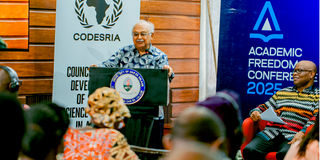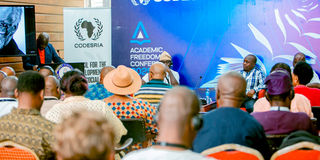How state control of varsity leadership threatens academic freedom

What you need to know:
- At a recent conference in Dar es Salaam, African scholars and education experts expressed deep concerns over the growing state control of public universities, where the president appoints top university leaders. This practice is seen as undermining academic freedom and intellectual autonomy—key pillars of higher education.
Scholars and education experts across Africa have raised serious concerns about how governments, including Tanzania's, are tightening their grip on public universities through top-level appointments.
The alarm was sounded at the just-ended Academic Freedom in Africa Conference held in Dar es Salaam, where local and international experts agreed that the way vice chancellors, chancellors, and council chairs are selected is undermining the independence of universities.
In Tanzania, the president appoints these top leaders. This practice, supported by the Universities Act of 2005 (Revised 2013) and university charters, gives the state a strong hand in how universities are run.
Critics say this poses a serious threat to intellectual autonomy, which is the foundation of higher education, and they call for establishing a University Service Commission, similar to the existing Judiciary Service Commission.
A seasoned academic from the University of Dar es Salaam, Prof Chris Maina, notes, “The government is always uncomfortable when universities are independent.” He adds, “You should look at how every curriculum must go through TCU (Tanzania Commission for Universities); yet here, we have our own departments and council… These are some of the things that suppress academic freedom.”
Prof Maina’s comments reflect a growing concern among academics that government involvement is becoming excessive and suppressive. Many believe that the state’s appointment of university leaders turns institutions of critical thinking into tools of compliance.

How did we get here?
According to constitutional law expert Prof Issa Shivji, the erosion of university independence in Tanzania can be traced back to the year 2000, when academics were formally placed under the civil service system. Since then, universities have gradually lost their autonomy.
“Now, if the government is interfering, how will you get people who dare to speak out?” Prof Shivji asked during an interview with Smart World. “The university leadership is required to protect the autonomy of the institution.”
He said there is a need to establish a commission that would protect academic freedom and allow scholars to operate outside the influence of the government.
“There should be a University Service Commission, and academics should have a special place in society, not be treated as civil servants,” he said.
Currently, the government not only appoints vice chancellors and chancellors but also handpicks the chairpersons of university councils.
These councils are the main decision-making bodies in universities. With top positions filled by presidential appointees, many university leaders avoid making decisions that could be seen as challenging the state.
“Once you know your job depends on the goodwill of the president, you think twice before taking any bold academic or administrative position,” said a senior lecturer at the University of Dodoma, who asked not to be named.
“This has made debates a thing of the past in our universities. The appointing authorities must be notified of the topic and the attendees to decide whether to allow it or not,” he added.
This system discourages open debate, research on sensitive issues, and criticism of state policies. It also creates an environment where loyalty matters more than competence.
Academic promotions are supposed to be based on merit—teaching, research, and publications. But even here, politics plays a role.
Since promotions are approved by councils and governing bodies chaired by presidential appointees, dissenting voices often find themselves sidelined or delayed in their career progression.
“People who speak out get frustrated,” said a lecturer from the Open University of Tanzania. “You may have the papers and publications, but if you're known for challenging authority, your file can ‘get lost.’”
From campus to cabinet
A growing concern among experts is the increasing trend of professors and senior lecturers being appointed to political and government positions. While this may be a sign that academics are trusted, it has also created instability in universities.
“Some of our most dependable professors and doctors are now ministers, regional commissioners, or heads of public institutions,” said former university lecturer Dr Ayub Mhede. “While that strengthens the government, it weakens universities.”
This trend has contributed to a shortage of senior lecturers and professors in many public universities. Some faculties are now struggling to find experienced supervisors for postgraduate students.
The pipeline of academic leadership is also under threat as fewer senior scholars remain in teaching and research roles.

The issue of state control is not unique to Tanzania. At the Dar es Salaam conference, experts from Malawi, Uganda, Nigeria, and South Africa echoed similar struggles.
Prof Roberts Muriisa, a governance scholar at Mbarara University of Science and Technology in Uganda, said, “In our case, presidential appointments of vice chancellors have created a culture of intellectual silence. Leaders won’t rock the boat because their job depends on political approval.”
He also stated that academics are sometimes suspended or punished for comments that do not align with government narratives. “And university leaders remain quiet because they don’t want to lose their jobs.”
Experts warn that this situation is damaging the core mission of universities—to be spaces of free thought, innovation, and critique.
With top leadership tied to political interests, universities are less likely to carry out bold research, influence national policy, or challenge harmful ideologies.
“Universities should be leading the way in solving national problems, not following politicians,” said Mr George Omondi, an expert from the African Research and Resource Forum based in Nairobi, Kenya. “But if leaders are appointed to please, not to lead, the entire purpose is lost.”
Some university administrators say they are trapped. On one hand, they are expected to meet the goals of academic excellence. On the other, they are pressured to follow government directives, even if these conflict with academic principles.
Can the trend be reversed?
A few scholars still believe that change is possible. They say Tanzania must reconsider how university leaders are selected. Instead of political appointments, they argue, a neutral and independent academic body should oversee these appointments, based on merit and leadership skills.
“Let us not fear autonomy,” said Ms Fatma Mwinyi, a law lecturer. “A strong university system does not mean a weak government. On the contrary, it supports development by providing critical thinking and informed voices.”
Others believe that academics must also organise and push back. “Freedom is never given,” said Prof Shivji. “It must be claimed professionally.”
The link between university leadership and state control in Tanzania is deep and complex. However, what is clear, according to scholars and education experts, is that the current model—where top positions are filled through presidential appointments—poses a real threat to the independence of public universities.
As more professors transition into political roles, and as academic promotions remain tied to council approvals influenced by state appointees, Tanzania is losing its brightest minds from the classroom to the corridors of power.
"If left unchecked, this may weaken not just universities but also the country’s long-term ability to think critically, innovate, and adapt to future challenges,” said Ms Mwinyi.





